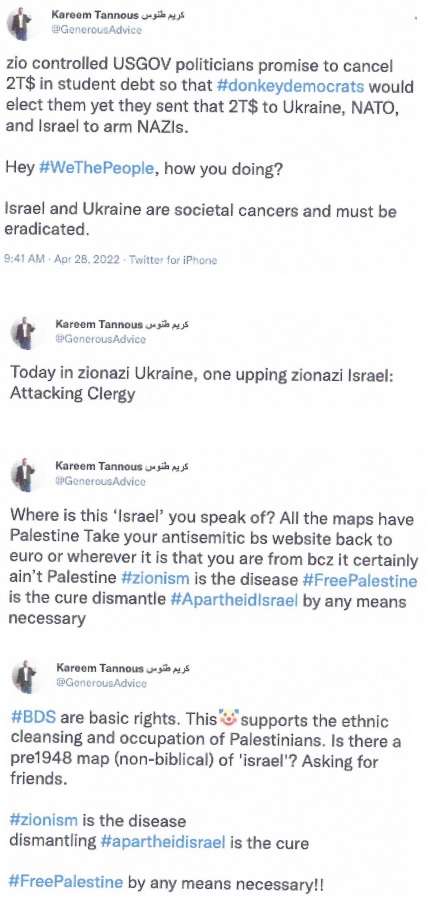From Judge Gerald McHugh's decision yesterday in Tannous v. Cabrini Univ. (E.D. Pa.):
This is an action brought by Kareem Tannous, a former university professor, against StopAntisemitism.org, a non-profit watchdog organization that reshared Plaintiff's social media posts with additional commentary…. [B]ecause I agree that Defendant's online blog constituted protected opinion under the First Amendment, even if it "cherry-picked" Plaintiff's tweets as alleged, I will dismiss Plaintiff's false light claim….
In July 2022, Defendant StopAntisemitism.org published an article titled, "Kareem Tannous—Professor of Hate," labeling Plaintiff as "Antisemite of the Week." The article referenced or reposted five tweets from Tannous' personal Twitter account with interspersed commentary, such as: "Tannous spreads conspiracy theories of Jewish control, refers to the Jewish people and nation as Nazis, incites violence, and calls [for] the eradication of Israel." Additionally, the article (1) requested that readers submit an ethnic discrimination complaint against Tannous, (2) encouraged readers to email the President of Cabrini University to "express … concern about Professor Kareem Tannous' ongoing antisemitism," and (3) commented that "[s]omeone with such intrinsic hatred often manifests their racism into real world situations and neither Jewish students nor faculty should have to be subjected to Kareem Tannous' bias." …
Last month, Judge McHugh dismissed plaintiff's defamation and tortious interference with business relations claim, but allowed the false light claim to go forward; but yesterday, the judge reconsidered that decision:
In Pennsylvania, false light invasion of privacy "imposes liability on a person who publishes material that 'is not true, is highly offensive to a reasonable person, and is publicized with knowledge or in reckless disregard of its falsity.'" Even if the published information is literally true, "[a] plaintiff can establish falsity by showing that a defendant 'selectively printed or broadcast true statements or pictures in a manner which created a false impression.'" …
[B]ecause "[t]he Supreme Court applied the New York Times 'actual malice' standard to false light claims in Time, Inc. v. Hill (1967) … false light invasion of privacy claims incorporate the same First Amendment protections as claims for defamation under state law." It follows that for both defamation and false light claims, "only statements of fact, rather than mere expressions of opinion, are actionable under Pennsylvania law," unless an opinion can "reasonably be understood to imply the existence of undisclosed defamatory facts justifying the opinion." …
I have already found, in dismissing Plaintiff's defamation claim, that Defendant's written statements in the article "are matters of opinion that are subject to disagreement and do not imply the presence of undisclosed facts." These comments therefore receive First Amendment protection and are not actionable under either defamation or false light.
I now further conclude that Defendant's publication of allegedly "cherry-picked" tweets by Plaintiff is protected by the First Amendment as well. Even if Defendant selectively republished the tweets to create a false impression that Plaintiff is antisemitic—which could satisfy the "falsity" prong of a false light claim—it nonetheless remains merely an opinion about Plaintiff, even if it is promoted through selectively reprinted material.
Nor did the republished tweets imply the presence of undisclosed facts about Plaintiff of a defamatory nature. Perhaps the tweets selected could have falsely implied that Plaintiff's Twitter page was devoid of more nuanced commentary, if, for example, he elsewhere distinguished between the Israeli government and Jewish people. But this, too, would constitute only Defendant's opinion about the thrust of Plaintiff's account. {Defendant's blog posts criticizing Plaintiff did not suggest that the highlighted tweets were exhaustively representative of the broader body of Plaintiff's online posts.} Thus, even if the tweets were "cherry-picked," they are protected under the First Amendment as examples offered to express an opinion that Plaintiff is antisemitic.
Here's a passage from the earlier opinion dismissing the defamation claim:
Additionally, … nowhere in the article can I discern any implication of undisclosed facts. Only one statement in the article warrants close analysis. It states: "Someone with such intrinsic hatred often manifests their racism into real world situations and neither Jewish students nor faculty should have to be subjected to Kareem Tannous' bias." Here, the article only speculates about what someone in Tannous' position might do—it does not imply that any violence or University-related misconduct has occurred. Such "equivocal or cautionary language" is non-actionable. And although I acknowledge that Tannous found the article deeply offensive, the statements within it are matters of opinion that are subject to disagreement and do not imply the presence of undisclosed facts. Therefore, the article is protected by the First Amendment and is non-defamatory.
And here are what appear to be the Tweets that formed the basis of StopAntiSemitism.org's accusations against Tannous, and that were quoted in those accusations (see here for the Tweets together with those accusations):

Cabrini's breach of contract claim (based on the Cabrini University faculty handbook promising academic freedom) survived the motion to dismiss.
StopAntiSemitism.org is represented by Stephen A. Miller and Gabriella M. Scott (Cozen O'Connor).
The post Characterizing Professor's Tweets as Anti-Semitic Isn't Actionable Libel or Invasion of Privacy appeared first on Reason.com.







